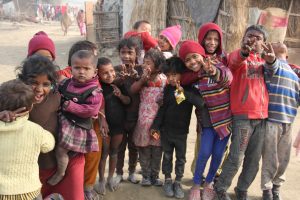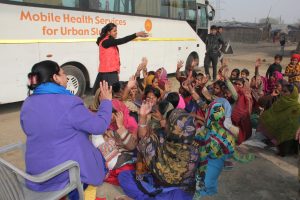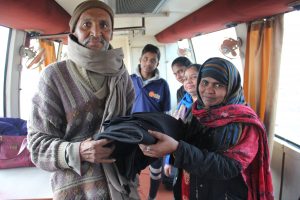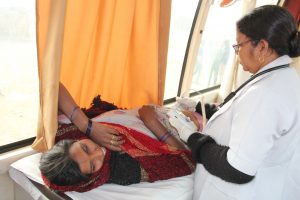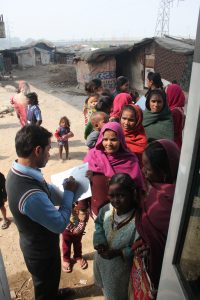
Asha (India)
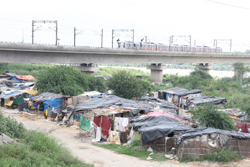
Asha is a charity that works to help improve the lives of the urban poor in India. I have seen first-hand the work of the charity in assisting impoverished communities to combat the issues that families within the slums face on a daily basis, by improving access to healthcare, financial services and education.
The Riverbed Slum community in India suffers from a lack of basic amenities such as clean drinking water, electricity, healthcare services and sanitation. Access to clean water is severely limited with one hand-pump catering to around 800 people. Lack of toilet facilities and other basic amenities encourages infections and diseases.
I wanted to help fund the work that Asha are doing within these slums, so AE Publications formed a partnership with Asha that sees a percentage of the money from every book sold by AEP donated to Asha’s East Delhi River Bed Slum Development Programme.
2017 Project Funding
In 2017, AE Publications donated £14,603.00 to Asha.
The money has gone towards projects to improve the health of those dwelling in the slum.
2016 Project Funding
In 2016, AE Publications donated £11,821 to Asha.
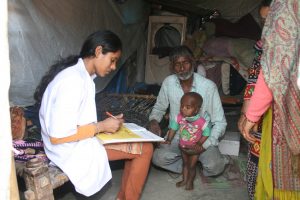
This money has gone towards projects that help improve the health of those dwelling in the slum, with the aim of lowering incidences of illness. The difference the donations are making to individual lives is invaluable.
- The Maternal and Newborn Health Programme included the training of Community Health Visitors that facilitated regular house visits to check up on all pregnant women. It educated parents to increase awareness of and access to quality maternal and newborn health services. It also promoted the necessity of a balanced, healthy diet and food supplements, and increased awareness of and access to quality health services for children under five.
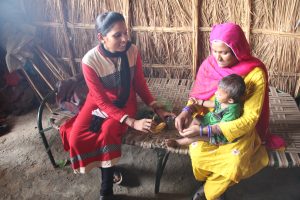
- ‘Well Baby’ clinics were organised in the mobile van clinic which covers the riverbed area on a weekly basis. The clinics undertook complete check-ups of newborn babies including height, weight and other vital parameters.
- 99% of children under five years old were given doses of Vitamin-A injections. 55% were vaccinated against Hepatitis-B, DTP, OPV, MMR, Typhoid and Tuberculosis. The rate of immunisation is expected to increase as more mothers are educated on the benefits.
- Six sanitation drives were organised to promote the importance of cleanliness and a sanitary environment for the healthy growth and development of young children.
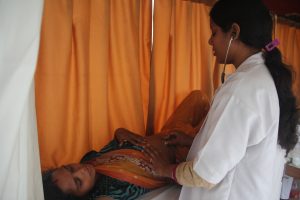
- Two Community Health Visitors were identified within the slum and trained in primary healthcare in the detection of disease symptoms. They can monitor patients and provide necessary advice regarding treatment and medicines. The effort of the CHVs ensured that almost 80% of pregnant ladies in the riverbed area had completed the three mandatory check-ups. Each Community Health Visitor covers 250-300 households across the riverbed. The timely action of one alert Community Health Visitor saved the life of a lady who became critically ill during pregnancy.
From Frail to Healthy, Gulshan Beats Malnutrition
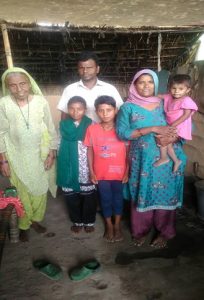 Until a year ago, Gulshan’s one-and-a-half-year-old body was frail and weak. She could hardly crawl around her little shanty in New Seelampur, a Delhi slum infamous for its poor living conditions. The toddler weighed less than the average Indian child, and her father, Jalaluddin, who earns a meagre ₹400 a day by selling vegetables, had little hope of her recuperating as she was unable to receive the nourishment she needed.
Until a year ago, Gulshan’s one-and-a-half-year-old body was frail and weak. She could hardly crawl around her little shanty in New Seelampur, a Delhi slum infamous for its poor living conditions. The toddler weighed less than the average Indian child, and her father, Jalaluddin, who earns a meagre ₹400 a day by selling vegetables, had little hope of her recuperating as she was unable to receive the nourishment she needed.
After the Asha team’s first visit to the area, they worked to provide Gulshan with a continuous supply of nutritious food that included eggs, milk and cereal. The team also provided Tonoferon and vitamin B-complex syrup; medicines that would ensure her healthy growth. The year’s supply of nutritious food and medicine, in addition to the constant efforts of the Asha team in supporting and monitoring Gulshan, has led to her now being totally recuperated at two-and-a-half years and means she is like any other child of her age; strong and happy.
“She can now easily walk. Earlier, her weak frame made crawling difficult,” says her mother. Anita, an Asha staff member, said, “We had to work very hard to ensure the child’s health, given that the environment and the locality need a lot of improvements.” The main aim of Asha’s healthcare programme is to support the child and also the family towards a healthy life.
The story of hope in the Riverbed area amidst despair and challenges
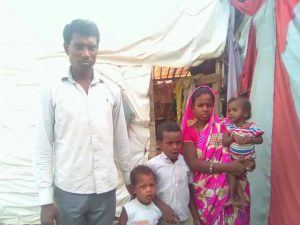 Suman, a two-and-a-half-year-old girl from the riverbed area of Seelampur, is the youngest child in a family of five. Her father, Manoj, is a rickshaw puller and her mother, Poonam, is a ragpicker. The family income is so meagre it does not cover their basic family needs. They live in appalling conditions of poverty in a poorly constructed shaft in the riverbed area. Suman was very weak, suffering from malnutrition and medical complications ever since she was born. The Asha team has looked after Suman since her birth. She was provided with food supplements including milk, eggs, fresh fruits and juices to ensure proper growth. Along with good food, Suman was given medicines including B-Complex and Tonoferon syrup for curing anaemia and poor food absorption. Suman’s house and the surrounding area was made as neat and clean as possible to reduce the spread of germs. The team visited her house regularly and monitored her situation, which has resulted in a remarkable improvement in Suman’s conditions and she is now growing as a normal healthy child. The team continues to visit on a regular basis.
Suman, a two-and-a-half-year-old girl from the riverbed area of Seelampur, is the youngest child in a family of five. Her father, Manoj, is a rickshaw puller and her mother, Poonam, is a ragpicker. The family income is so meagre it does not cover their basic family needs. They live in appalling conditions of poverty in a poorly constructed shaft in the riverbed area. Suman was very weak, suffering from malnutrition and medical complications ever since she was born. The Asha team has looked after Suman since her birth. She was provided with food supplements including milk, eggs, fresh fruits and juices to ensure proper growth. Along with good food, Suman was given medicines including B-Complex and Tonoferon syrup for curing anaemia and poor food absorption. Suman’s house and the surrounding area was made as neat and clean as possible to reduce the spread of germs. The team visited her house regularly and monitored her situation, which has resulted in a remarkable improvement in Suman’s conditions and she is now growing as a normal healthy child. The team continues to visit on a regular basis.
About Asha
Asha, which means ‘hope’ in Hindi, was founded in 1988 by Dr Kiran Martin after she heard about a cholera outbreak in a Del
hi slum and decided to use her talents in the field of medicine to save lives there. From these beginnings, Asha has grown into a charity that now works with over 500,000 people in more than 60 slum colonies. The charity helps communities tackle the multitude of problems they face on a daily basis by improving access to healthcare, financial services and education.
The goal and objectives of Asha’s programmes are in accordance with the UN Sustainable Development Goals. These include cultivating community partnerships for development, ensuring environmental sustainability, combatting HIV/AIDS and other diseases, improving maternal health, reducing child mortality, promoting gender equality and empowering women. The aim of the Riverbed Slum project is to implement a health programme to help improve the quality of life of the 15,000 residents who live there and introduce a health service for newborn babies and their mothers.
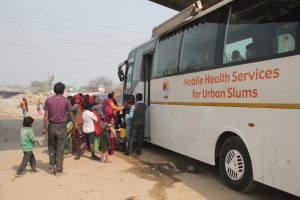 Donate directly to Asha
Donate directly to Asha
Please visit www.asha-india.org for more information on the work of Asha or to make a donation to the charity.
